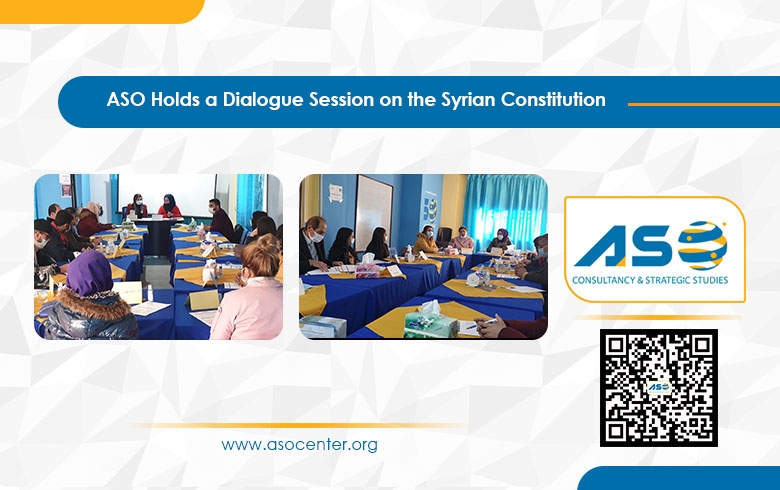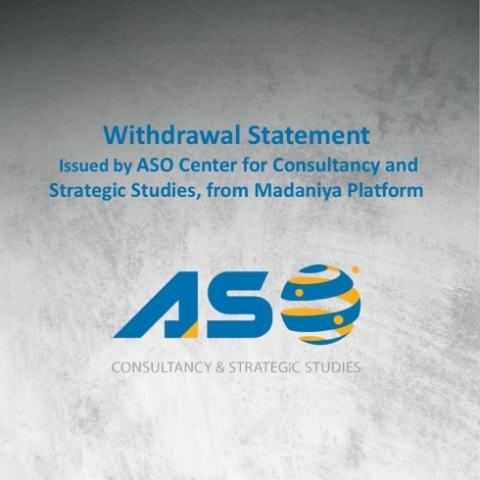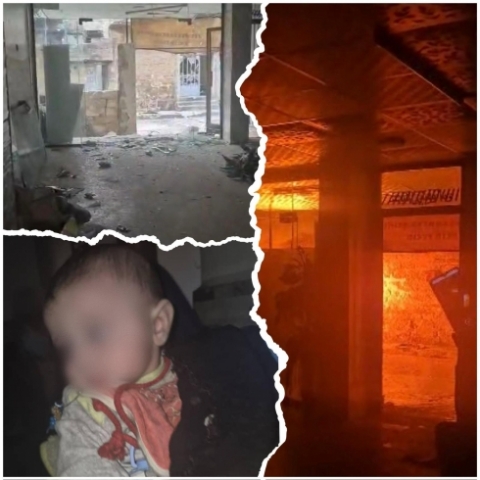

ASO Holds a Dialogue Session on the Syrian Constitution
2021-01-11
Shilan Shekhmous - ASO
ASO Center for Consultancy and Strategic Studies holds a dialogue session to discuss the latest developments of the Syrian Constitutional Committee in Geneva.
The session was attended by a group of /15/ participants from jurists, civil activists and workers in the civil institutions in the Autonomous Administration areas. The session was held on December 17, 2020 at ASO's headquarter in Amouda.
The topics of the session circled around priorities in Syria, constitutional perseverance, religion, values and their importance as well as the mechanism of forming the executive authority, and finally the form of governance in Syria, recommendations and proposals.
This session is considered as part of the activities of the Governance Department at ASO center which aims at discussing what the Syrian Constitutional Committee has reached and whether it is achieving what the Syrian public wishes.
By casting light on the first axis of the session, the late report of the UN special envoy Geir Pedersen of the last round that was carried out for the constitutional committee was first discussed. The point of views of the participants were concurrent over ‘’the necessity of a ceasefire, and usually, in all disputes in general, there must be planning for setting the constitution after the ceasefire and after the return of the forcibly-displaced without external pressures and not in the light of the ongoing conflicts in separate areas of Syria!’’.
In return, a jurist participant indicated that ‘’one of the persons within the field-advisory team with the former UN special envoy for the Syrian crisis, Stefan De Mistura noticed after many years of the Syrian crisis that people are not the decision-makers in the country.
While the second axis about the constitutional endeavors and how far the people are well-informed about, participants said that ‘’most of Syrians are not aware of what the committee is doing, as it was not elected by the people in the first place and therefore is not of credibility. Secondly, the people are only informed with that which media provides for the people’’.
As for the constitutional endeavors and religion, according to some participants ‘’the separation of the state from religion, namely it should be a secular state, and if the Islamic Provisions were endorsed in the constitution then fear will lie in the exploitation by radical Islamic groups’’.
Others support ‘’not to ignore Islamic Law in the constitution, yet it shall not be the main source due to the diversity of beliefs in Syria’’.
In the next axis, the values and the arrangement according to the importance and the guarantee of the constitution for workers and women rights, participants concentrated on the main problem in the constitution, which is ‘’lack of truly-implementation, for example, the Syrian constitution may adopt the international human rights laws in its constitution, yet these laws and rights are not actually applied to the people’’.
As for the fifth axis concerning the mechanism of forming the executive authority, one of the views of some participants in the dialogue session was that ‘’the best and most developed democratic and national standards for the formation of the executive authority and the profit from the people experiences that are characterized with security and peace shall be followed up’’.
Besides, some others see that ‘’since 1930, the old constitutions in Syria have differed through historical transformations and political ones during the twentieth century. It focused on the mixed system that divides the executive power between the president of the government and the president of the republic’’.
Thus, the best proposal according to what some participants have mentioned is that the next parliament in Syria shall be in two-chambers form. The first consists of elected members and it has the legislative authority and the second shall have an observation task over the first chamber and its members are from dignitaries, supporters and local leaders representing all components and segments of the Syrian community.
As for the political system in Syria (the type of governance, the central issues and the national identities) and reaching the most suitable form of bypassing sectarian issues and guaranteeing the acknowledgment of intellectual rights and cultural rights of the religious, national and ethnic minorities in Syria.
All participants stressed the importance of the ‘’decentralization of governance’’ within the constitution. The principle of citizenship in a way that does not contradict the decentralization, but rather it conforms with it. Also, it shall be the state of nationhood and law and the issue of the Kurdish language in the country will be bypassed. In addition, granting the Autonomous Administration a special state in the constitution and the form of governance’’.
Concerning the recommendations, participants put forward a number of suggestions, which included the following:
1- Cease-fire, the release of all forcibly detained, find a solution for the matter of the absentees and the lost and expelling foreigners from the country at first then the commencement of writing the constitution for the country.
2- The concentration on the rights of the minorities in Syria.
3- Teaching the Kurdish language as a second language in the country after the Arabic language.
4- Introducing the constitutional committee and its agenda more clearly to the Syrian people through holding sessions and dialogue workshops.
5- In addition to focusing on the form of governance (decentralization).
6- The involvement of all ruling parties in Syria (the Autonomous Administration) in the constitutional committee.
In conclusion, Ahlam Hasan, a researcher in the Governance Department at ASO Center said ‘’discussing the constitutional committee proceedings is one of the important issues in NES, especially after excluding the role of the Autonomous Administration from the committee, which is the only ruling authority in the region. Thus, we held this discussion session in order to consider some aspects concerning this issue and to put the people of the region views forward to the competent authorities’’.
According to what she concluded from the participants, "the opinions of the majority focused on the Kurdish rights in the constitution, especially the cultural and language rights, that trust is an important factor for the success of any political project. However, what we perceive today is the lack of its availability between the political blocs and then the social components," Hasan added.



